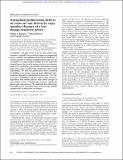Aneuploid proliferation defects in yeast are not driven by copy number changes of a few dosage-sensitive genes
Author(s)
Moriya, Hisao; Bonney, Megan Ellis; Amon, Angelika B
DownloadBonney-2015-Aneuploid proliferat.pdf (351.1Kb)
PUBLISHER_CC
Publisher with Creative Commons License
Creative Commons Attribution
Terms of use
Metadata
Show full item recordAbstract
Aneuploidy—the gain or loss of one or more whole chromosome—typically has an adverse impact on organismal fitness, manifest in conditions such as Down syndrome. A central question is whether aneuploid phenotypes are the consequence of copy number changes of a few especially harmful genes that may be present on the extra chromosome or are caused by copy number alterations of many genes that confer no observable phenotype when varied individually. We used the proliferation defect exhibited by budding yeast strains carrying single additional chromosomes (disomes) to distinguish between the “few critical genes” hypothesis and the “mass action of genes” hypothesis. Our results indicate that subtle changes in gene dosage across a chromosome can have significant phenotypic consequences. We conclude that phenotypic thresholds can be crossed by mass action of copy number changes that, on their own, are benign.
Date issued
2015-05Department
Massachusetts Institute of Technology. Department of Biology; Koch Institute for Integrative Cancer Research at MITJournal
Genes & Development
Publisher
Cold Spring Harbor Laboratory Press
Citation
Bonney, Megan E., Hisao Moriya, and Angelika Amon. “Aneuploid Proliferation Defects in Yeast Are Not Driven by Copy Number Changes of a Few Dosage-Sensitive Genes.” Genes Dev. 29, no. 9 (May 1, 2015): 898–903.
Version: Final published version
ISSN
0890-9369
1549-5477